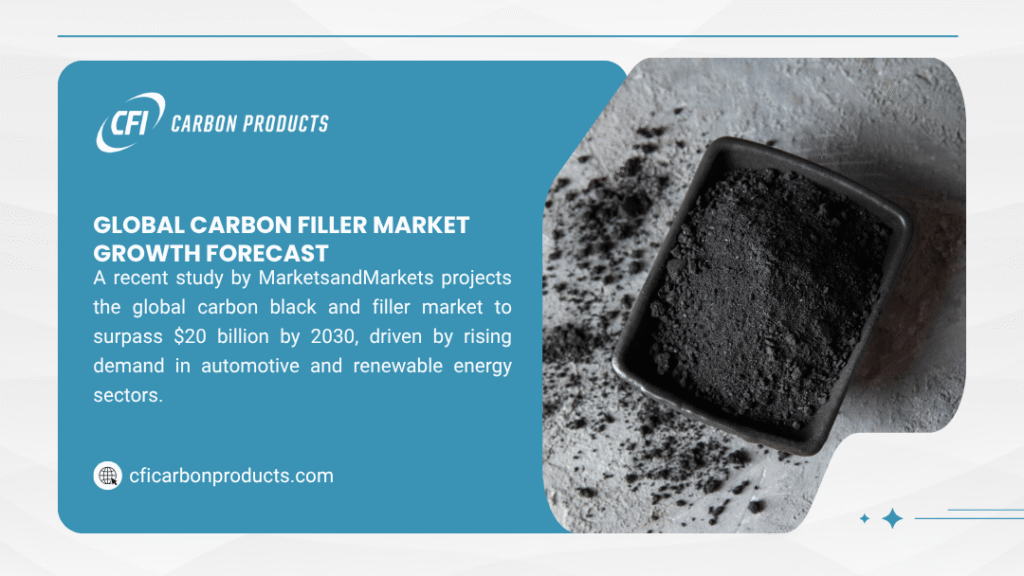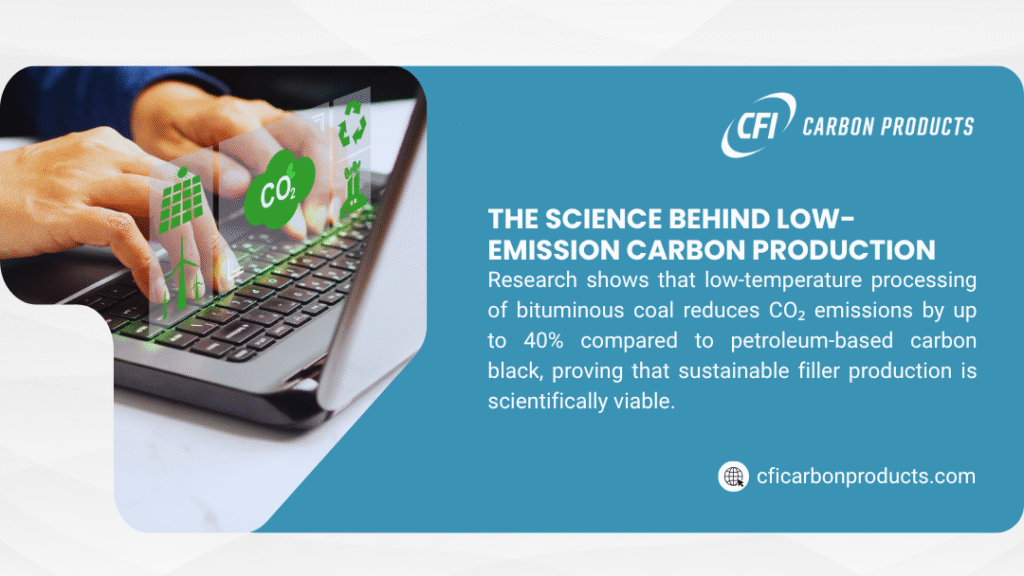This article examines how a reliable industrial carbon supplier shapes the future of modern manufacturing by combining performance, sustainability, and cost efficiency. It outlines how carbon materials determine the strength, flexibility, and stability of products across key sectors such as rubber, plastics, silicone, and coatings.
The discussion focuses on the work of CFI Carbon Products, a U.S.-based manufacturer with decades of experience in sustainable filler technology. Through its flagship material, Austin Black 325, CFI demonstrates how a balance between low emissions, superior processability, and dependable performance can redefine how industries approach material sourcing.
Readers will also learn how industrial carbon supply influences product profitability, global manufacturing trends, and eco-efficient production systems.
The Role of an Industrial Carbon Supplier in Material Performance
In industrial manufacturing, the performance of a product often depends on the quality of its carbon-based additives. An industrial carbon supplier provides materials that influence the strength, thermal resistance, and chemical stability of end products. For industries focused on precision, such as rubber, coatings, and polymers, carbon fillers play a decisive role in balancing cost and functionality.
CFI Carbon Products leads this space with Austin Black 325, an organic filler derived from select bituminous coal. Unlike petroleum-based carbon black, this product delivers a low-emission, low-specific-gravity alternative that helps reduce both weight and energy consumption. These qualities directly affect productivity and long-term profitability for manufacturers who prioritize consistency in every batch.
| Filler Type | Source | Specific Gravity | Emission Level | Key Advantage |
| Conventional Carbon Black | Petroleum-based | High | High | Reinforcement |
| Austin Black 325 | Bituminous Coal | Low | Low | Lightweight filler, reduced CO₂ impact |
| Recycled Carbon Powder | Mixed Waste | Variable | Moderate | Cost reduction |
CFI’s approach provides a material solution that enhances processability while reducing environmental load, aligning with global demands for cleaner, high-performance fillers.
Why Sustainability Defines a Modern Industrial Carbon Supplier
Modern manufacturing standards have shifted toward responsible production. A leading industrial carbon supplier must now deliver reliable performance while keeping environmental impact low. CFI Carbon Products achieves this through a controlled process that minimizes emissions and energy use without compromising product quality.
Its production facilities in West Virginia and Virginia are positioned near raw material sources, cutting transport emissions and delays. The company’s operational efficiency supports consistent global delivery, proving that environmental responsibility and supply reliability can coexist. Additional insights on this approach can be found on CFI’s Sustainability page, where the company outlines its long-term vision for eco-efficient operations.
| Sustainability Focus | CFI Practice | Industry Benefit |
| Low CO₂ Emission Production | Controlled bituminous coal processing | Reduced carbon footprint |
| Energy Efficiency | Streamlined grinding and milling | Lower operational cost |
| Waste Management | Minimal waste discharge | Cleaner production cycle |
| Logistics Optimization | Strategic plant locations | Reliable global delivery |
With these measures, CFI sets a benchmark among carbon suppliers worldwide, showing how long-term investment in sustainability leads to industrial stability and customer trust.
Industrial Carbon and Its Role in Rubber, Plastics, and Silicone
Each industry depends on its industrial carbon supplier to provide consistent, application-specific filler properties. The same carbon material that enhances a rubber seal might also serve as a pigment or reinforcement in plastics.
In the rubber industry, Austin Black 325 acts as a performance filler, offering strength and uniform dispersion while lowering compound density. This improvement supports the production of components like gaskets, vibration mounts, and hoses that require long-term flexibility.
In the plastics sector, CFI’s filler increases stiffness and color consistency while reducing resin usage. The same characteristics make it ideal for automotive and construction parts, where the balance between weight and toughness determines value.
The silicone and coatings industries also rely on high-purity carbon fillers for consistency and dispersion stability. Their importance extends to specialized applications discussed on carbon black for coatings, where performance pigments must meet rigorous industrial standards.
| Industry | Function of Carbon Filler | Typical Application |
| Rubber | Reinforcement and weight control | Tires, gaskets, vibration dampers |
| Plastics | Mechanical stability and color control | Automotive parts, casings |
| Silicone | Surface smoothness and consistency | Seals, electronics |
| Coatings | Pigment balance and film strength | Industrial paints, sealants |
Through these applications, the supplier’s expertise determines the final product’s cost-effectiveness and durability, factors directly tied to the success of every manufacturing process.

How an Industrial Carbon Supplier Drives Profitability
Profitability in manufacturing depends on operational control and raw material reliability. CFI Carbon Products contributes to both through filler technology that enhances production speed, lowers energy demand, and minimizes waste. Each metric translates to cost savings that strengthen industrial competitiveness.
CFI’s customer partnerships extend beyond material supply. The company offers formula testing, lab sampling, and toll grinding services, services described in detail on the CFI Services. This flexibility allows clients to refine their compounds without compromising performance.
| Business Aspect | Impact of Austin Black 325 | Result |
| Processing Time | Faster mixing | Reduced production cycles |
| Product Weight | Lower density | Shipping cost savings |
| Consistency | Uniform dispersion | Fewer defects |
| Energy Use | Lower curing temperature | Improved operational efficiency |
Every modern industrial carbon supplier aims to help customers achieve measurable gains. CFI’s low-emission filler not only supports material performance but also enhances profitability, aligning commercial success with environmental accountability.
Carbon Structure and Its Role in Industrial Applications
The efficiency of an industrial carbon supplier depends largely on its mastery of carbon structure. The internal arrangement of carbon atoms defines the material’s density, conductivity, and surface activity. These parameters influence how the filler behaves when blended with polymers, resins, or elastomers.
CFI Carbon Products produces Austin Black 325 with a uniform particle size and controlled structure, resulting in predictable performance across different compounds. A review of carbon black structure shows that parameters such as surface area and porosity dictate how fillers bond with rubber or plastic molecules. CFI optimizes these traits to improve tensile strength and dimensional stability in finished goods.
| Structural Feature | Functional Role | Performance Effect |
| Particle Size | Controls dispersion and color depth | Improved uniformity |
| Surface Area | Determines reinforcement potential | Better mechanical strength |
| Porosity | Affects liquid absorption | Enhanced binder interaction |
| Density | Influences processing and weight | Lighter formulations |
This precision allows industries to fine-tune their products without changing base materials, lowering both design risk and cost.
The Conductive and Insulating Behavior of Industrial Carbon
Electrical behavior is another area where an industrial carbon supplier adds value. Depending on its processing, carbon may serve as a conductor or an insulator. CFI Carbon Products offers fillers that maintain controlled resistivity, suitable for applications demanding static dissipation or signal shielding.
The company’s technical resources, including its carbon conductive and resistivity of carbon, describe how variations in structure and purity influence conductivity. In coatings, this property prevents electrostatic buildup; in plastics, it supports safety standards in sensitive environments such as electronic housings.
Through research-driven control of these electrical characteristics, CFI helps customers match filler performance with design requirements. This balance of insulation and conduction capacity demonstrates why precision in carbon formulation matters in every industrial field.

Global Demand for Industrial Carbon Suppliers
Global industries continue to expand their use of carbon-based fillers. Market demand has grown due to rising production in sectors such as automotive, construction, and renewable energy. Manufacturers now seek an industrial carbon supplier capable of meeting international specifications while remaining cost-efficient and environmentally sound.
CFI Carbon Products operates from strategic locations in the United States but exports to more than 30 countries. Its distribution model combines direct supply with partnerships across Europe and Asia, allowing localized support without compromising quality. With over three decades of operational experience, the company remains among the most trusted carbon manufacturers in the USA, serving clients who require consistent particle quality and dependable logistics.
| Global Trend | Industry Response | CFI Advantage |
| Demand for Lightweight Materials | Automotive and aerospace innovation | Low-density Austin Black 325 |
| Regulatory Pressure on Emissions | Shift to eco-friendly production | Low-CO₂ process design |
| Supply Chain Localization | Regional production hubs | U.S. facilities with global reach |
| Demand for Sustainable Sourcing | Emphasis on environmental standards | Proven track record in sustainability |
As industrial carbon continues to evolve from a commodity to a specialized material, suppliers with technical expertise and supply reliability will define the future of manufacturing.
Technical and Service Excellence
Beyond material innovation, a leading industrial carbon supplier must support its clients with technical insight and consistent service. CFI Carbon Products maintains this standard through close customer collaboration and a practical support framework. Each partnership begins with a technical evaluation, followed by testing and formulation advice based on actual production data.
The company’s dedication to service quality is reflected in its customer satisfaction metrics; over 94% of surveyed clients rate CFI’s service as above average or excellent. This combination of material science and customer alignment helps manufacturers refine performance outcomes, stabilize costs, and maintain sustainable production cycles.
Sustainability and Future Directions
The future of carbon manufacturing is tied to environmental compliance and material circularity. An industrial carbon supplier that can minimize emissions while improving product efficiency gains long-term strategic relevance.
CFI Carbon Products integrates sustainability across its operations, from sourcing and refining to packaging and logistics. Its sustainability program addresses both carbon emissions and energy use, positioning the company to meet emerging global standards.
Additionally, its focus on responsible material handling supports industries aiming to produce eco-friendly and environmentally responsible products without sacrificing mechanical strength or durability.
Emerging research in polymer composites, conductive coatings, and energy-efficient rubber compounds continues to expand the role of high-performance carbon fillers. CFI’s readiness to adapt and innovate secures its place as a long-term partner for manufacturers investing in next-generation materials.

Conclusion: Partnering with a Trusted Industrial Carbon Supplier
Every manufacturer seeking consistency, cost control, and environmental balance relies on the strength of its raw material partners. A proven industrial carbon supplier like CFI Carbon Products offers not just filler materials, but a pathway toward higher process efficiency, stronger performance, and measurable sustainability.
The company’s dedication to low-emission production, advanced filler technology, and personalized service defines its leadership in industrial carbon supply. Through its flagship Austin Black 325, CFI continues to support industries worldwide with solutions that merge technical precision and environmental responsibility.
To explore customized filler options for your next formulation, visit the Austin Black 325 page or connect through the CFI Services portal. Partnering with CFI means working with a supplier that combines decades of expertise, dependable global delivery, and a clear commitment to sustainable industrial progress.

